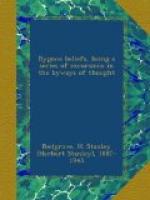[2] EMANUEL SWEDENBORG: Arcana Caelestia, SE 6692.
[1b] ARTHUR EDWARD WAITE: The Occult Sciences (1891), p. 51.
These “psychological experiments” were not, save, perhaps, in rare cases, carried out in the spirit of modern psychical research, with the high aim of the man of science. It was, indeed, far otherwise; selfish motives were at the root of most of them; and, apart from what may be termed “medicinal magic,” it was for the satisfaction of greed, lust, revenge, that men and women had recourse to magical arts. The history of goeticism and witchcraft is one of the most horrible of all histories. The “Grimoires,” witnesses to the superstitious folly of the past, are full of disgusting, absurd, and even criminal rites for the satisfaction of unlawful desires and passions. The Church was certainly justified in attempting to put down the practice of magic, but the means adopted in this design and the results to which they led were even more abominable than witchcraft itself. The methods of detecting witches and the tortures to which suspected persons were subjected to force them to confess to imaginary crimes, employed in so-called civilised England and Scotland and also in America, to say nothing of countries in which the “Holy” Inquisition held undisputed sway, are almost too horrible to describe. For details the reader may be referred to Sir WALTER SCOTT’S Letters on Demonology and Witchcraft (1830), and (as concerns America) COTTON MATHER’S The Wonders of the Invisible World (1692). The credulous Church and the credulous people were terribly afraid of the power of witchcraft, and, as always, fear destroyed their mental balance and made them totally disregard the demands of justice. The result may be well illustrated by what almost inevitably happens when a country goes to war; for war, as the Hon. BERTRAND RUSSELL has well shown, is fear’s offspring. Fear of the enemy causes the military party to persecute in an insensate manner, without the least regard to justice, all those of their fellow-men whom they consider are not heart and soul with them in their cause; similarly the Church relentlessly persecuted its supposed enemies, of whom it was so afraid. No doubt some of the poor wretches that were tortured and killed on the charge of witchcraft really believed themselves to have made a pact with the devil, and were thus morally depraved, though, generally speaking, they were no more responsible for their actions than any other madmen. But the majority of the persons persecuted as witches and wizards were innocent even of this.




